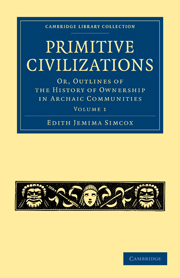Book contents
- Frontmatter
- PREFACE
- Contents
- CHAPTER 1 INTRODUCTION
- CHAPTER II PREHISTORIC PROBLEMS
- BOOK I OWNERSHIP IN EGYPT
- CHAPTER I THE MONARCHY AND THE ROYAL OFFICERS
- CHAPTER II THE ECONOMIC ORDER
- CHAPTER III COMMERCE AND INDUSTRY
- CHAPTER IV CASTE AND DESCENT
- CHAPTER V THE MILITARY CLASS
- CHAPTER VI THE NATIONAL RELIGION AND THE PRIESTHOOD
- CHAPTER VII CIVIL LAW AND CUSTOM
- CHAPTER VIII DOMESTIC RELATIONS AND FAMILY LAW
- BOOK II ANCIENT BABYLONIA
- BOOK III FROM MASSALIA TO MALABAR
CHAPTER VIII - DOMESTIC RELATIONS AND FAMILY LAW
Published online by Cambridge University Press: 07 September 2011
- Frontmatter
- PREFACE
- Contents
- CHAPTER 1 INTRODUCTION
- CHAPTER II PREHISTORIC PROBLEMS
- BOOK I OWNERSHIP IN EGYPT
- CHAPTER I THE MONARCHY AND THE ROYAL OFFICERS
- CHAPTER II THE ECONOMIC ORDER
- CHAPTER III COMMERCE AND INDUSTRY
- CHAPTER IV CASTE AND DESCENT
- CHAPTER V THE MILITARY CLASS
- CHAPTER VI THE NATIONAL RELIGION AND THE PRIESTHOOD
- CHAPTER VII CIVIL LAW AND CUSTOM
- CHAPTER VIII DOMESTIC RELATIONS AND FAMILY LAW
- BOOK II ANCIENT BABYLONIA
- BOOK III FROM MASSALIA TO MALABAR
Summary
DOMESTIC RELATIONSHIPS.
The family relations of the ancient Egyptians are abundantly illustrated by their inscriptions, and it is not supposed that the legislative reforms of Bocchoris effected any change in the national customs regarding marriage and inheritance. We are, however, indebted to him for the abundance of written materials bearing on this subject, by the help of which we are not only able to form some idea of the spirit of Egyptian family life, but also to reconstruct in outline the legal status and proprietary rights of different members of the family group, as recognised from the Thirty-second to the Twelfth Dynasty, and most probably back to a still earlier date.
Reference has been made already to the ideal of a great and good Egyptian as set forth in ancient epitaphs, but the domestic virtues are as much insisted on as the liberal wisdom desiderated in a governor of men. The subject of an inscription of the Fifth Dynasty calls upon his descendants to bear witness for their ancestor that he was one “who lived in peace and wrought righteousness, loving his father, loving his mother, giving way to his companions; the joy of his brothers, the beloved of his servants, no accuser or slanderer, a teller of the truth which is dear to God.” In an epitaph of the Hyksos period, the speaker, who boasts a family of sixty children, says of himself: “I loved my father, I honoured my mother, my brother and my sisters loved me.”
- Type
- Chapter
- Information
- Primitive CivilizationsOr, Outlines of the History of Ownership in Archaic Communities, pp. 198 - 226Publisher: Cambridge University PressPrint publication year: 2010First published in: 1894



